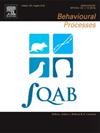Premises for digital twins reporting on Atlantic salmon wellbeing
IF 1.3
4区 生物学
Q4 BEHAVIORAL SCIENCES
引用次数: 0
Abstract
Many species of fish, birds and mammals commonly live in human captivity; Atlantic salmon Salmo salar is one of them. The international legal status of the welfare of captive animals is slowly developing and still requires rigorous specification. For example, even though fish have complex cognition and elements of sentience, The United Nations’ animal welfare principles still take a functional health-centred perspective overlooking the cognitive-affective component. Wellbeing problems remain a major source of slow growth and high mortality in intensive aquaculture of Atlantic salmon. The value system for decision making in vertebrates is based on expectations of emotional wellbeing for the options available and is linked with the individual’s assessment of its future. We propose a new approach for monitoring and improving the welfare of salmon (or any other captive or wild vertebrate) based on modelling the salmon’s wellbeing system by digital twins, which are simulation models that implement major bodily mechanisms of the organism. Indeed, predictions on boredom, stress and wellbeing can all be captured by a computational evolutionary model of the factors underlying behaviour. We explain how such an agent-based model of salmon digital twins can be constructed by modelling a salmon’s subjective wellbeing experience along with prediction of its near future and allostasis (the bodily preparation for the expected near future). We attempt to identify the building blocks required in digital twin models to deliver early warnings about escalating issues that could eventually lead to negative effects on salmon health in aquaculture. These models would provide critical insights for optimizing production processes and could significantly reduce the reliance on animal experiments. Overall, reports of a population of digital twins could support the implementation of 3Rs - replacement, reduction, refinement - by offering actionable information to fish farmers as well as consumers, voters, politicians and regulators on relevant issues as well as guide experimental work on animal wellbeing across species.
数字双胞胎报告大西洋鲑鱼健康状况的场所。
许多种类的鱼类、鸟类和哺乳动物通常生活在人类的囚禁中;大西洋鲑鱼就是其中之一。圈养动物福利的国际法律地位发展缓慢,仍需严格规范。例如,尽管鱼类具有复杂的认知和感知要素,但联合国的动物福利原则仍然采取以功能健康为中心的观点,忽视了认知-情感成分。健康问题仍然是大西洋鲑鱼集约化养殖中生长缓慢和死亡率高的主要原因。脊椎动物的决策价值体系是基于对可用选项的情感健康预期,并与个体对其未来的评估联系在一起。我们提出了一种监测和改善鲑鱼(或任何其他圈养或野生脊椎动物)福利的新方法,该方法基于通过数字双胞胎对鲑鱼的健康系统进行建模,数字双胞胎是实现生物体主要身体机制的模拟模型。事实上,对无聊、压力和幸福感的预测都可以通过行为背后因素的计算进化模型来实现。我们解释了这样一个基于主体的鲑鱼数字双胞胎模型是如何通过模拟鲑鱼的主观健康体验以及对其近期的预测和适应性(为预期的近期的身体准备)来构建的。我们试图确定数字孪生模型中所需的构建模块,以提供有关升级问题的早期预警,这些问题最终可能导致对水产养殖中鲑鱼健康的负面影响。这些模型将为优化生产过程提供关键的见解,并可以显著减少对动物实验的依赖。总体而言,关于数字孪生种群的报告可以为养鱼户、消费者、选民、政治家和监管机构提供相关问题的可操作信息,并指导跨物种动物福利的实验工作,从而支持3r(替代、减少、改进)的实施。
本文章由计算机程序翻译,如有差异,请以英文原文为准。
求助全文
约1分钟内获得全文
求助全文
来源期刊

Behavioural Processes
生物-动物学
CiteScore
2.70
自引率
7.70%
发文量
144
审稿时长
4-8 weeks
期刊介绍:
Behavioural Processes is dedicated to the publication of high-quality original research on animal behaviour from any theoretical perspective. It welcomes contributions that consider animal behaviour from behavioural analytic, cognitive, ethological, ecological and evolutionary points of view. This list is not intended to be exhaustive, and papers that integrate theory and methodology across disciplines are particularly welcome.
 求助内容:
求助内容: 应助结果提醒方式:
应助结果提醒方式:


